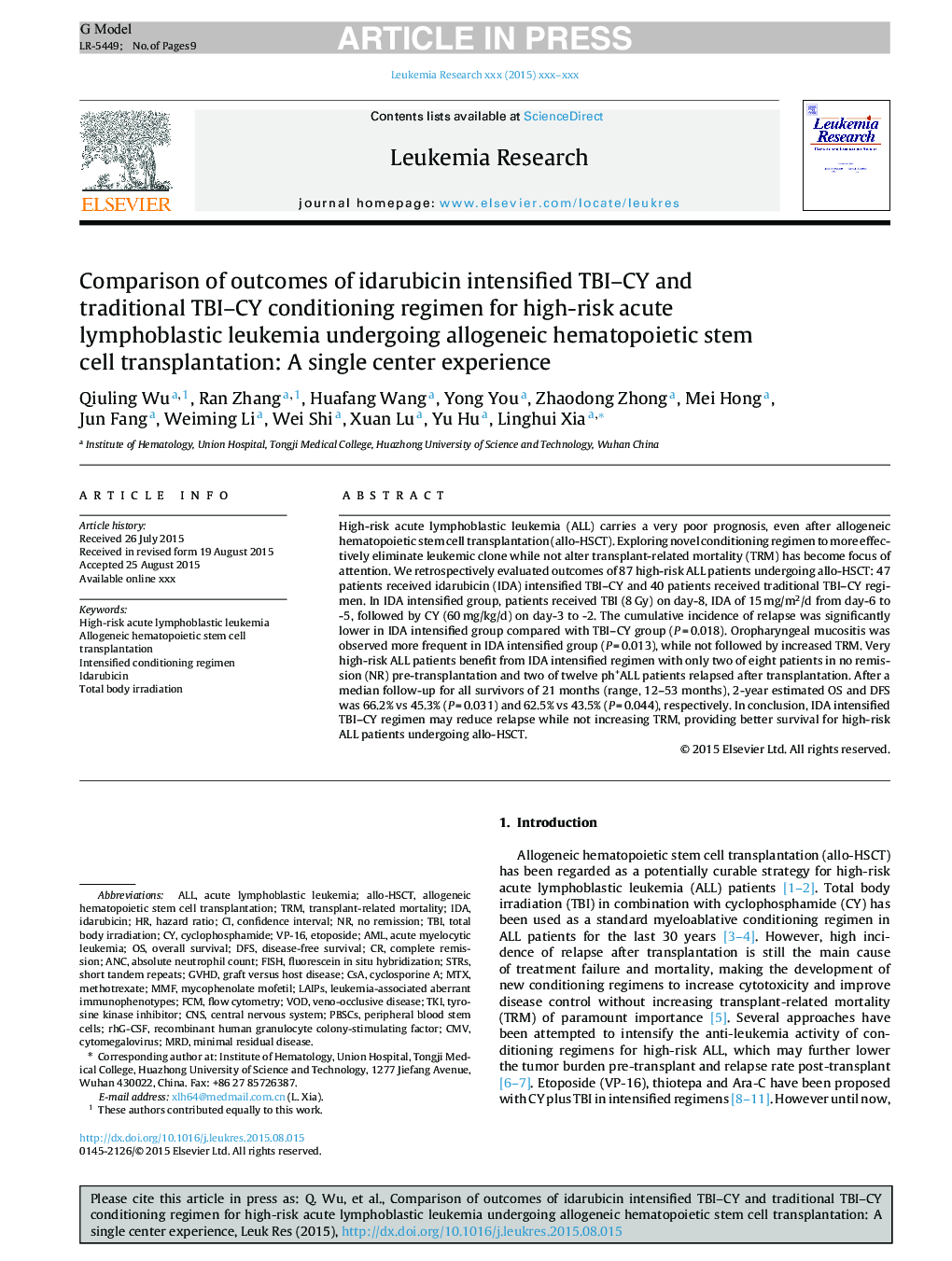| Article ID | Journal | Published Year | Pages | File Type |
|---|---|---|---|---|
| 10908621 | Leukemia Research | 2015 | 9 Pages |
Abstract
High-risk acute lymphoblastic leukemia (ALL) carries a very poor prognosis, even after allogeneic hematopoietic stem cell transplantation (allo-HSCT). Exploring novel conditioning regimen to more effectively eliminate leukemic clone while not alter transplant-related mortality (TRM) has become focus of attention. We retrospectively evaluated outcomes of 87 high-risk ALL patients undergoing allo-HSCT: 47 patients received idarubicin (IDA) intensified TBI-CY and 40 patients received traditional TBI-CY regimen. In IDA intensified group, patients received TBI (8Â Gy) on day-8, IDA of 15Â mg/m2/d from day-6 to -5, followed by CY (60Â mg/kg/d) on day-3 to -2. The cumulative incidence of relapse was significantly lower in IDA intensified group compared with TBI-CY group (PÂ =Â 0.018). Oropharyngeal mucositis was observed more frequent in IDA intensified group (PÂ =Â 0.013), while not followed by increased TRM. Very high-risk ALL patients benefit from IDA intensified regimen with only two of eight patients in no remission (NR) pre-transplantation and two of twelve ph+ALL patients relapsed after transplantation. After a median follow-up for all survivors of 21 months (range, 12-53 months), 2-year estimated OS and DFS was 66.2% vs 45.3% (PÂ =Â 0.031) and 62.5% vs 43.5% (PÂ =Â 0.044), respectively. In conclusion, IDA intensified TBI-CY regimen may reduce relapse while not increasing TRM, providing better survival for high-risk ALL patients undergoing allo-HSCT.
Keywords
VP-16MTXrhG-CSFMMFANCDFSTKIIDAMRDTBIAMLGvHDPBSCsFCMVODTRMSTRsEtoposideTotal body irradiationAllo-HSCTCSAIdarubicindisease-free survivaloverall survivalVeno-occlusive diseaseShort tandem repeatsAbsolute neutrophil countMinimal residual diseaseCNScomplete remissionPeripheral blood stem cellscytomegalovirusCMVcentral nervous systemCyclosporine ACyclophosphamideconfidence intervalRecombinant human granulocyte colony-stimulating factorFlow cytometryAcute lymphoblastic leukemiaAcute myelocytic leukemiaFishmycophenolate mofetilMethotrexateTransplant-related mortalityTyrosine kinase inhibitorhazard ratioALLGraft versus host diseaseAllogeneic hematopoietic stem cell transplantation
Related Topics
Life Sciences
Biochemistry, Genetics and Molecular Biology
Cancer Research
Authors
Qiuling Wu, Ran Zhang, Huafang Wang, Yong You, Zhaodong Zhong, Mei Hong, Jun Fang, Weiming Li, Wei Shi, Xuan Lu, Yu Hu, Linghui Xia,
